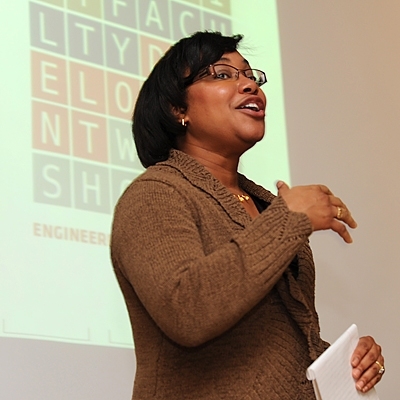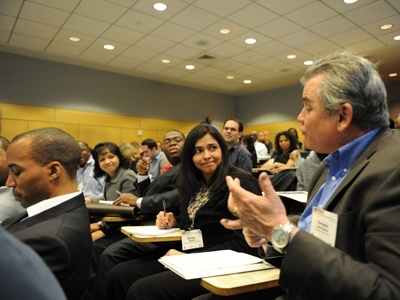More than 75 minority faculty members from across the nation gathered at MIT this week for a three-day workshop designed to provide them with tools and strategies to better navigate their careers.
Co-organized by MIT and the Georgia Institute of Technology, the National Science Foundation Minority Faculty Development Workshop took place from March 21-24 and featured presentations and networking activities to help support the career development and retention of faculty from underrepresented groups, as defined by the NSF (African Americans, Hispanics and Native Americans).
Workshop participants were tenure-track faculty members from four-year institutions who represented the spectrum of engineering and science disciplines.
“The persistent underrepresentation of minority engineering faculty threatens the development of a diverse science and engineering workforce and requires sustained multi-faceted and multi-level approaches for mitigation,” said Georgia Tech Professor and Associate Chair for Graduate Studies Gilda A. Barabino, who collaborated with Wesley Harris, MIT’s associate provost for faculty equity, to organize the workshop.
“[This workshop] represents one approach that simultaneously provides opportunities for professional development, networking and mentoring that have been shown to enhance career success,” Barabino said.
Showcasing innovation
The workshop was the fifth in a series that has been offered for graduate students and faculty since 2001 by the Minority Faculty Development Forum, an online community of underrepresented faculty who engage in networking and research collaborations, mentoring, and dissemination of resources, ideas and best practices.
This year marked the first time that the conference was open only to faculty members. The workshop’s theme was “Engineering Faculty Success” and featured a poster competition that showcased the innovative research of about 50 of the workshop participants.
The winner of the competition was Cullen Buie, an assistant professor of mechanical engineering and director of the Laboratory for Energy and Microsystems Innovation (LEMI), who joined the MIT faculty in November. His poster highlighted his research involving a technique to create nanoporous surfaces than can be used for energy and industrial applications, such as reducing the drag of water flowing through a pipe.
“There were several outstanding projects from all over the nation and I’m humbled and honored to have won the competition,” said Buie, who also praised the “very supportive environment” of the conference.
The workshop also featured a number of presentations by leading scholars, including how-to sessions about becoming a tenured professor, sowing the seeds of a solid research program, tapping into funding opportunities and finding and utilizing effective mentors.
Several sessions focused on strategies and concepts that have long been identified and utilized in the business world, but are not often associated with academia, such as the art of strategic persuasion or how to craft a professorial brand.
These types of skills are just starting to be taught in the faculty development arena, said Robbin Chapman, assistant associate provost for faculty equity at MIT, who helped organize the conference and hosted the session on crafting a professorial brand. “With the advent of social media, we want our graduate students and faculty scholars to leverage their brand to promote their reputation — otherwise, they’ll fall behind,” she said.
Institute as model
The NSF workshop follows the January release of a report by MIT’s Initiative on Faculty Race and Diversity, which concluded that more effective policies and practices are needed to hire and retain underrepresented minority faculty at the Institute. Although the NSF conference was not a direct outgrowth of the report, Chapman thinks more members of the MIT community may have noticed and attended the poster competition in light of the report.
She added that the workshop sheds light on the continuing work and efforts by the Office of the Associate Provosts for Faculty Equity, which was founded by President Susan Hockfield and Provost L. Rafael Reif in 2006 to focus on the recruitment, retention, promotion and professional development of underrepresented minority and women faculty.
“Leadership for faculty equity and diversification is critical and that shown by Wes Harris and MIT in support of the workshop and in other Institute efforts serves as a model for others,” Barabino said.
Co-organized by MIT and the Georgia Institute of Technology, the National Science Foundation Minority Faculty Development Workshop took place from March 21-24 and featured presentations and networking activities to help support the career development and retention of faculty from underrepresented groups, as defined by the NSF (African Americans, Hispanics and Native Americans).
Workshop participants were tenure-track faculty members from four-year institutions who represented the spectrum of engineering and science disciplines.
“The persistent underrepresentation of minority engineering faculty threatens the development of a diverse science and engineering workforce and requires sustained multi-faceted and multi-level approaches for mitigation,” said Georgia Tech Professor and Associate Chair for Graduate Studies Gilda A. Barabino, who collaborated with Wesley Harris, MIT’s associate provost for faculty equity, to organize the workshop.
“[This workshop] represents one approach that simultaneously provides opportunities for professional development, networking and mentoring that have been shown to enhance career success,” Barabino said.
Showcasing innovation
The workshop was the fifth in a series that has been offered for graduate students and faculty since 2001 by the Minority Faculty Development Forum, an online community of underrepresented faculty who engage in networking and research collaborations, mentoring, and dissemination of resources, ideas and best practices.
This year marked the first time that the conference was open only to faculty members. The workshop’s theme was “Engineering Faculty Success” and featured a poster competition that showcased the innovative research of about 50 of the workshop participants.
The winner of the competition was Cullen Buie, an assistant professor of mechanical engineering and director of the Laboratory for Energy and Microsystems Innovation (LEMI), who joined the MIT faculty in November. His poster highlighted his research involving a technique to create nanoporous surfaces than can be used for energy and industrial applications, such as reducing the drag of water flowing through a pipe.
“There were several outstanding projects from all over the nation and I’m humbled and honored to have won the competition,” said Buie, who also praised the “very supportive environment” of the conference.
The workshop also featured a number of presentations by leading scholars, including how-to sessions about becoming a tenured professor, sowing the seeds of a solid research program, tapping into funding opportunities and finding and utilizing effective mentors.
Several sessions focused on strategies and concepts that have long been identified and utilized in the business world, but are not often associated with academia, such as the art of strategic persuasion or how to craft a professorial brand.
These types of skills are just starting to be taught in the faculty development arena, said Robbin Chapman, assistant associate provost for faculty equity at MIT, who helped organize the conference and hosted the session on crafting a professorial brand. “With the advent of social media, we want our graduate students and faculty scholars to leverage their brand to promote their reputation — otherwise, they’ll fall behind,” she said.
Institute as model
The NSF workshop follows the January release of a report by MIT’s Initiative on Faculty Race and Diversity, which concluded that more effective policies and practices are needed to hire and retain underrepresented minority faculty at the Institute. Although the NSF conference was not a direct outgrowth of the report, Chapman thinks more members of the MIT community may have noticed and attended the poster competition in light of the report.
She added that the workshop sheds light on the continuing work and efforts by the Office of the Associate Provosts for Faculty Equity, which was founded by President Susan Hockfield and Provost L. Rafael Reif in 2006 to focus on the recruitment, retention, promotion and professional development of underrepresented minority and women faculty.
“Leadership for faculty equity and diversification is critical and that shown by Wes Harris and MIT in support of the workshop and in other Institute efforts serves as a model for others,” Barabino said.







